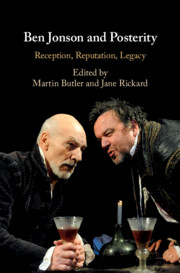Book contents
- Ben Jonson and Posterity
- Ben Jonson and Posterity
- Copyright page
- Dedication
- Contents
- Figures
- Contributors
- Acknowledgements
- Citations and Abbreviations
- Introduction: Immortal Ben Jonson
- Part I Conceptualizing Jonson
- Chapter 1 Popular Jonson
- Chapter 2 Pedantic Jonson
- Chapter 3 Corporeal Jonson
- Part II Jonson’s Early Reception
- Part III Jonsonian Afterlives
- Index
Chapter 3 - Corporeal Jonson
from Part I - Conceptualizing Jonson
Published online by Cambridge University Press: 24 September 2020
- Ben Jonson and Posterity
- Ben Jonson and Posterity
- Copyright page
- Dedication
- Contents
- Figures
- Contributors
- Acknowledgements
- Citations and Abbreviations
- Introduction: Immortal Ben Jonson
- Part I Conceptualizing Jonson
- Chapter 1 Popular Jonson
- Chapter 2 Pedantic Jonson
- Chapter 3 Corporeal Jonson
- Part II Jonson’s Early Reception
- Part III Jonsonian Afterlives
- Index
Summary
In ‘Inviting a Friend to Supper’ Jonson celebrates an Horatian ideal of modest conviviality with intimates. The ironies of that poem, which hint at excesses waiting to erupt, point to another way in which he could be seen – as a man given to bodily excess and driven by his appetites.The anecdote of Jonson drawn drunk through Paris on a cart by his young tutee, Wat Raleigh, helped construct that image, along with the many references to his love of wine and to his physically imposing body.This essay explores the ways in which Jonson’s London plays – especially Epicene, Bartholomew Fair, and The Alchemist – contributed to his popular image as a recorder of and participant in the sensory excesses possible in the urban context where he spent much of his life. Jonson was acutely attuned to the sensory environment of London: to the sounds, sights, smells, and touches that invited its residents to indulge their senses even while threatening to shatter their self-control and social identities. This essay demonstrates the role of the urban plays in the construction of a Jonson whose contemporary image was in part defined by his corporeality and immersion in the life of the senses.
- Type
- Chapter
- Information
- Ben Jonson and PosterityReception, Reputation, Legacy, pp. 63 - 82Publisher: Cambridge University PressPrint publication year: 2020



